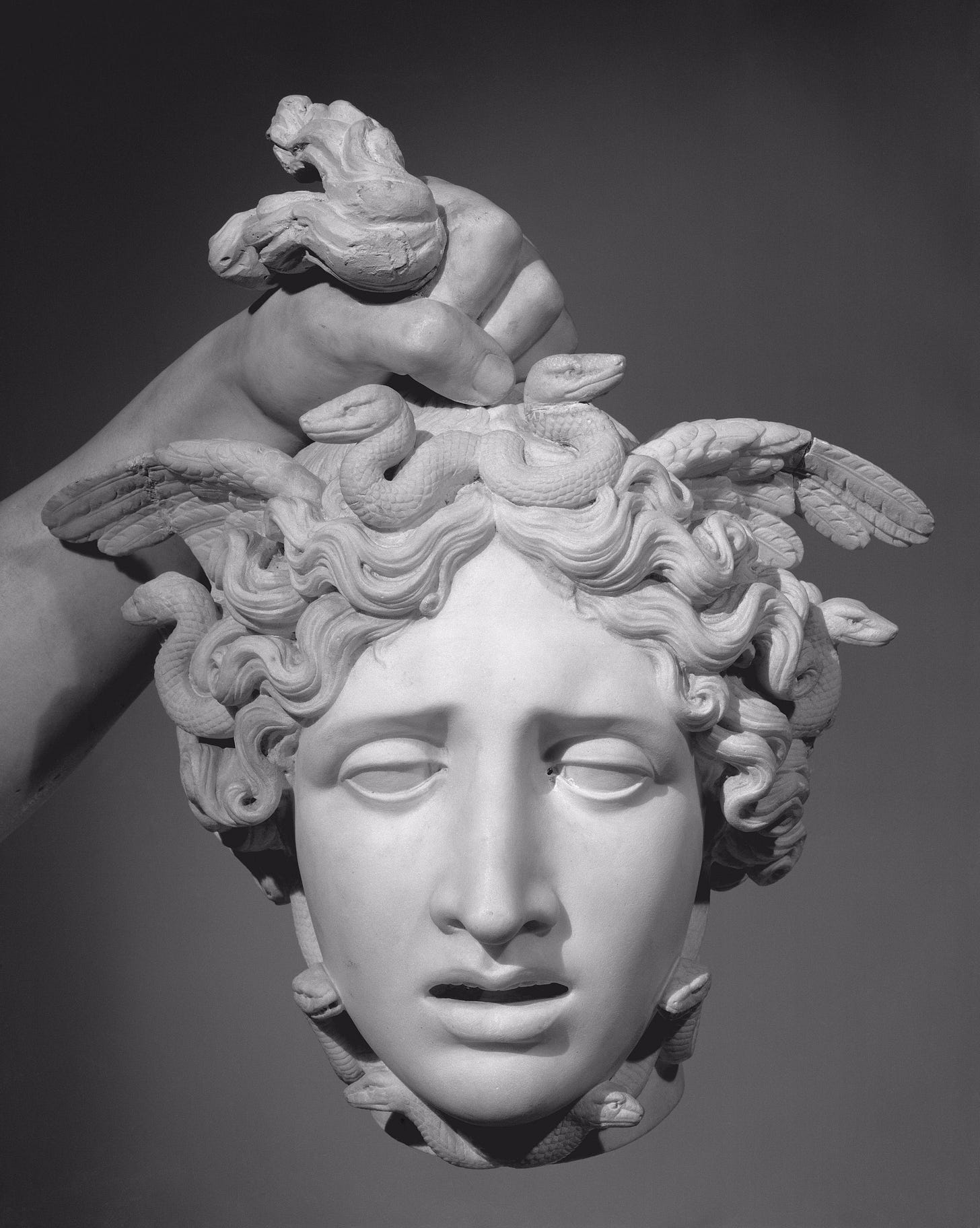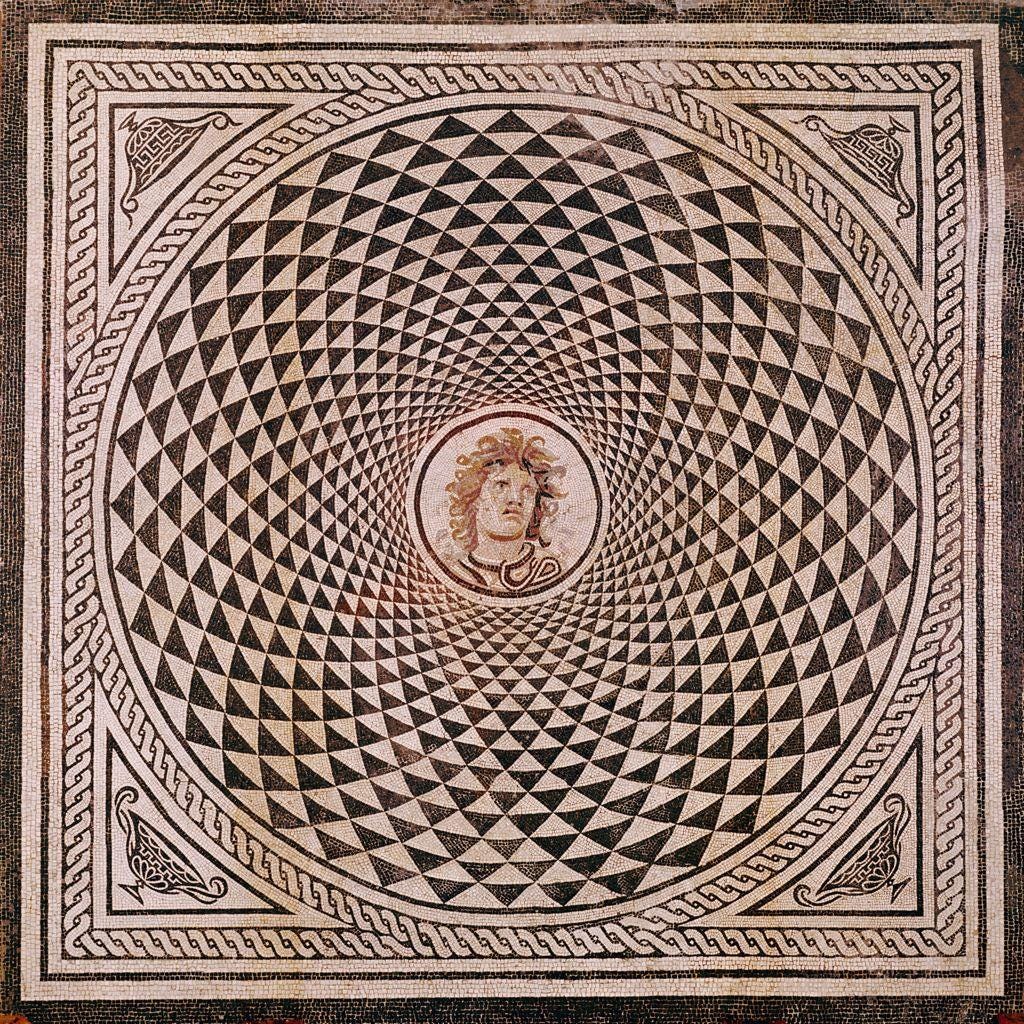Obscenity is an integral part of the stylistics of power. . . . The penis [is] a historical phenomenon in its own right. . . . The [autocrat] thinks and expresses himself through his phallus. . . . Without a phallus, the [autocrat] is nothing, has no fixed identity. Thanks to his phallus, the [autocrat’s] cruelty can stand quite naked: erect. —Achille Mbembe, Necropolitics
Welcome to the Red Read!
where with a read thread
we weave a braid between divination, indigeneity and decoloniality.
If you have the means and value indigiqueer writing, then why not paint the world red with me? I invite you to consider becoming a paid subscriber, a student &/ or a client:
The world moves so goddamn fast I’m spinning out over cyclical bills, heartache, disaster, defeat. Time persists but Am*rica regresses regularly. Waiting for change is decadent, immoral. It leaves you with an acute withering emptiness.
And yet for years I’ve been waiting to be wanted. This desiring desire has only collapsed my will. It has left me heavy-limbed and still, turned me into this grotesque, passive, waiting figure frozen in time. Waiting is my curse. This all-demanding desire has deflated me with its disrespect and deception. Somehow desiring men has rendered me disposable. I am always alone and its always silent.
So my mantra through this fallen Mars retrograde is fuck men. Fuck men because I’m over fucking them. I’m over how cavalierly they disclose their desires to lay claim to a woman’s body. Fuck how they fetishize transwomen. All they want is to discharge their authority. They want to recklessly consume women as some kind of entitled compensation for the failure of their assumed phallic power.
I get told all the time that I’m beautiful but only by men who see my beauty as a challenge that must be contested. The beautiful woman is a provocation. And so on so many calls with my beautiful sister-friends we commiserate surviving endlessly lustful, vulgar men that only want to fuck women in some pornographic disembodied fantasy. Our new rule is no new boyfriends. No more disembodied fucking.
A retrograde fallen Mars has me wondering: Who gets to own the phallus?, and why do they wield it? Obviously the phallus is less a biological penis than the symbolic weapon for asserting autocratic authority and perpetuating patriarchal prerogatives over all genders.
Pungent shamelessness propels obscene men to presidency. A presidential phallus with an obsession with obscenity enlists men who would assault women to put them in their “proper” place, subservient and in service of the phallus. These fuckers like Tucker Carlson get on stage to say “Daddy’s home” and so we’ve become bad little girls that need to be spanked, vigorously. A fallen Mars puts on the pose of fatherhood to relish in a violating incest; offering an unconscious compensation for incels who feel emasculated or that they’ve been cucked by women and queers who refuse to drown in the terrifying masculinity that is as tragic as it is violent.
The audience’s gratuitous applause celebrate the common fantasy of an all accessible authoritarian phallus being indulged. The established relationship of conviviality between the authoritarian and his audience is an intended effect of what Achille Mbembe calls an aesthetics of vulgarity. The vulgarity of this phallic language may seem to position the fascist as some sort of subversive or rebel. It is a way of extending an invitation to the ruled to join in an assault on those who actually rebel against the authoritarianism that the autocrat champions. But vulgar language never needs, never allows a narrative reciprocity. Nothing democratic is here offered nor celebrated. The defiance deployed in the obscene performance is phony as it’s deep conservatism demands the audience submits to the authoritarian imagination. The pleasure the cheering audience partakes in is inherently tied to their willing participation in the imaginative violation of the other, particularly girls.
So obviously as it is the daughter that must be punished by this fascist “daddy”, the scene becomes pornographic for the reproduction of sadistic male thrill. In Pornography and Silence, Susan Griffin tells that us that pornography wants to forget all knowledge of the nude female body that recalls for us “our mothers, our infancy, our vulnerability, the knowledge of our body, and the meaning of nature,” because it presences our own mortality. It then defames that naked femaleness, “ridicules it, punishes it, tries to destroy the power of its presence in our minds.” 1
All these impotent men offer no golden phallus, nothing that impresses, nor induces pleasure. It is used only to threaten, to coerce submission. This puerile phallus is policing. Used to avenge a fragile ego, it becomes a menacing sign of terror against anything that could castrate the president and his limp little fantasies of power.
Australian philosopher Kate Manne helps us understand that:
“Misogyny is what happens when women break ranks or roles and disrupt the patriarchal order: they tend to be perceived as uppity, unruly, out of line, or insubordinate. . . . Misogyny isn’t simply hateful; it imposes social costs on noncompliant women. . . . Think of misogyny, then, as the law enforcement branch of a patriarchal order. This makes for a useful if rough contrast between misogyny and sexism. Whereas misogyny upholds the social norms of patriarchies by patrolling and policing them, sexism serves to justify these norms, largely via an ideology of supposedly natural differences between men and women with respect to their talents, interests, proclivities, and appetites. Sexism is bookish; misogyny is combative. Sexism is complacent; misogyny is anxious. Sexism has a theory; misogyny wields a cudgel.”2
Women who attempt to seize the phallus for themselves are heretical and so like Medusa they must be made ugly for speaking out. And then so some man can self-fashion himself a hero, she always end up decapitated. After Perseus cut off Medusa’s head, he returned to the king of Argos and used her petrifying gaze to turn Polydektes and his entourage to stone, and saved his mother from an unwanted marriage. Medusa embodies male fear of female power, so she is disfigured, murdered.
Medusa is a fitting Mars meditation as both particularly associate with the head. Mars is the Emperor in tarot, and the Emperor’s head is the one that is crowned. The Medusa head is meant to be apotropaic for the Gorgon gaze drives evil away. The Gorgon arrests motion. As Mars moves ever so slowly in the primordial cancerian waters, it will eventually come to a standstill on February 23rd. Planetary movement tells us the emphasis on stillness is accomplished within a continuum of motion. But as Mars is masculinity and as it is falls to a total stop, its as if he is being slowly turned to stone by a feminized monstrosity. But of course a misogynist, patriarchal society will feminize monsters to demonize women.
Mars is rash. It is the principle of a burning impetuosity. It is the force, the discomfort that spurs action. It is careless as it coarse, profane as it is slanderous. The male gaze is martial. In rage and pain all one sees is wasteland. It is never a simple looking, it is imperious. It is an act toward possession. The intense power of female eros is made monstrous by male desire. The misogynist male gaze can’t handle the piercing female subjectivity Medusa manifests. Anger becomes a forced obsession.
Without a head the male spectator is no longer threatened with a counter-subjectivity. As she is mutilated she symbolizes the way men relegate women to a visual objectivity. Thus, as an icon for the female gaze Medusa ironically is also the classical example of the female object. Hers is the look of other, that which reveals the physical, psychic vulnerability, the fragility of being rendered and reduced to the status of a thing. Patriarchy defends against this potential objectification as a susceptible uncovering by destroying female subjectivity.
But her petrifying gaze is also emblematic of the absolute. The psyche would shatter should it peer into a God’s domain. The unmediated power is too great to face. Like looking upon the eclipsed sun, your eyes would be burned blind from even just a short while staring into that black Sun. This sight is so psychologically overwhelming you might never again be able to see yourself in the mirror the same.
The room in which you find yourself might stand still. Disheveled in a stream of sunlight the story becomes confessional in the way that what usually stays hidden in the darkness has been exposed.
Maybe then he would stop wolf-whistling women. Maybe then he will apologize and take responsibility. Maybe then he’ll do all the heavy healing work to again become sensitive. Maybe that open vulnerability would help him move past his violent abusive dad. Maybe he will see how ugly misogyny makes him. Maybe he’ll stop pretending that he’s protecting anyone.

See the gorgon can help us rediscover the powerful agency that resides in stillness. While the Greek notions of stasis have an array of meanings such as erection, standing stone, pillar, stationary and sluggishness, the Emperors of 10th century Byzantine cultivated stillness as a physical and symbolic ideal. It was expected that those within the most exalted of aristocratic and ecclesiastical ranks display an astounding capacity for stillness. This quality was allied to taxis, or order, which was meant to regulate the earthly realm as well as determine a divinely ordained hierarchy and all its accompanying positions. It was meant as a method to imitate and maintain universal harmony. As a court ritual it aimed to impress the public with the Emperor’s majesty. Byzantine emperors would hear complaints in a prolonged motionlessness, or priests would stand before the congregation as “erect and still as a statue.”3 It was vital that the Byzantine sovereign be seen as stable, fixed and unmovable for he was to be the strong foundation that the stability of society required. The character and judgement was to be tempered, never a megalomaniac swayed by emotional impulse.
Spectacularly grandiose, the throne room was filled with gilt bronze trees, artificial birds singing perched upon its branches, lions roaring in rhythm and the Automata throne that levitated in the air at distinct intervals. The unmoving emperor, seated and still on his lifted golden throne, was a counterpoint to all this sudden, unexpected surrounding movement. In this central, raised shining place he becomes the Sun. Stillness was assumed by the highest authority that was very intentionally juxtaposed with movement as its antithesis.
Similarly entering the atrium of a church could produce a religious resonance. Photios, the Patriarch of Constantinople, describes the magnificence of this physical-spiritual setting as one that roots him to the ground while at the same time sensing that “everything is in ecstatic motion..and the church is circling around . . the spectator, through his whirling about in all directions and being constantly astir, . . . imagines that his personal condition is transferred to the object.”4 A physical stillness is inverted in the projection of one’s own inner turbulence. Again this counterpoint of “rootedness” and ecstatic “whirling” is established. One may be struck still but sensations are stirred to such an extent that the gorgons gift of a vigorous intellect are clarified.
The Gorgon is grim but the Greek verb gorgeuw (γοργεύω) means “to hasten,” or “to move rapidly.” The Suda, the 10th-century Byzantine lexicon and encyclopedia, makes mention of Medusa to say that Perseus named her the Gorgon, after decapitating her, because her head was sheer energy, with all the accompanying vigor and force of a quicksilver intelligence. If Athena has a shield to turn treachery away with wisdom then the Gorgon is centered on the aegis because she not only arrests the assaulting phallus, but also possesses the swiftest intellect.
The ontological status of the Gorgon’s head is bewildering. Even severed from the body you’ll be rock hard from seeing it. Blood rises from the fountain of her dissociation and winged horses fly forth. Blood rises and empires fall.
The Byzantine monastery sought the blessings of stillness through stringent and severe physical conflict, further relating the martial with an arrested motion. A monk is martial because as he is stationary, as his perfect stillness entails his movement around divine realities, he has strenuously labored with extreme mental and bodily exertion. Stillness is achieved and sustained by chanting and the physicality of prayer postures. Holy meditations are meant to evoke vividly emotive and animate mental landscapes so that the detached ascetic become still. St. Gregory of Sinai says that when one waits attentively upon the Divine that stillness becomes an achievement of an enraptured soul flight toward the holy.5
The path to stillness has a demanding regime. It’ll exhaust your intellect and stress your body. Suspending horror and deflecting fear requires a female gaze for then we won’t be possessed but allowed to live. Extreme states of being may be constantly juxtaposed such that by integrating antithesis as a habit of thought a rhythm emerges that shakes loose any stuck sensibilities. Joy joins grief, past plays with present, life pairs with death and stillness is a byproduct of movement. Medusa may have been murdered but still she is vitally alive.
This fallen, retrograde Mars incessantly sends so many unwanted dick pics to women that his throne is nothing but one big phallic accumulation. This Mars is not so much red as orange. He imagines himself Emperor of the world and won’t stop signing executive orders in a jarring attempt to stop, silence, cease the migrant bodies, the queers, the transwomen, the disabled, the many many people who won’t cheer him on as he masturbates a mockery of masculinity, leadership and power. All the urgency with which he’s signs these memorandums, proclamations and executive orders belie all the bombast of his phallic performance. Motion may be ceased only temporarily.
The siren song Medusa speaks is the bird speech of constant contradiction. The gorgon persists to teach us that stillness yields a resilient rhythm, a rhythm that is as migrant as the planets above and as varied the unbound bodies below. So like Ms. Jackson the only nasty thing I like is a nasty groove and though nasty boys don’t ever change, not even a single one of them means a damn thing.
X,
Christopher
Susan Griffin, Pornography and Silence (New York: Harper & Row, 1981), 261.
Manne, Kate (2017). Down Girl: The Logic of Misogyny. Oxford University Press.
Gregory of Nazianz, "Eulogy on Basil of Caesarea," 52.2, in Patrologiae cursus completus. Series Craeca (Paris, 1857-1889), vol. 36, 569A.
C. Mango, The Art of the Byzantine Empire, 312-1453: Sources and Documents (Toronto, 1986), p. 1
St. Gregory of Sinai, "On Commandments and Doctrines, Warnings and Promises; on Thoughts, Passions and Virtues, and also on Stillness and Prayer: One Hundred and Thirty-Seven Texts," in The Philokalia (see note 14), p. 237.










